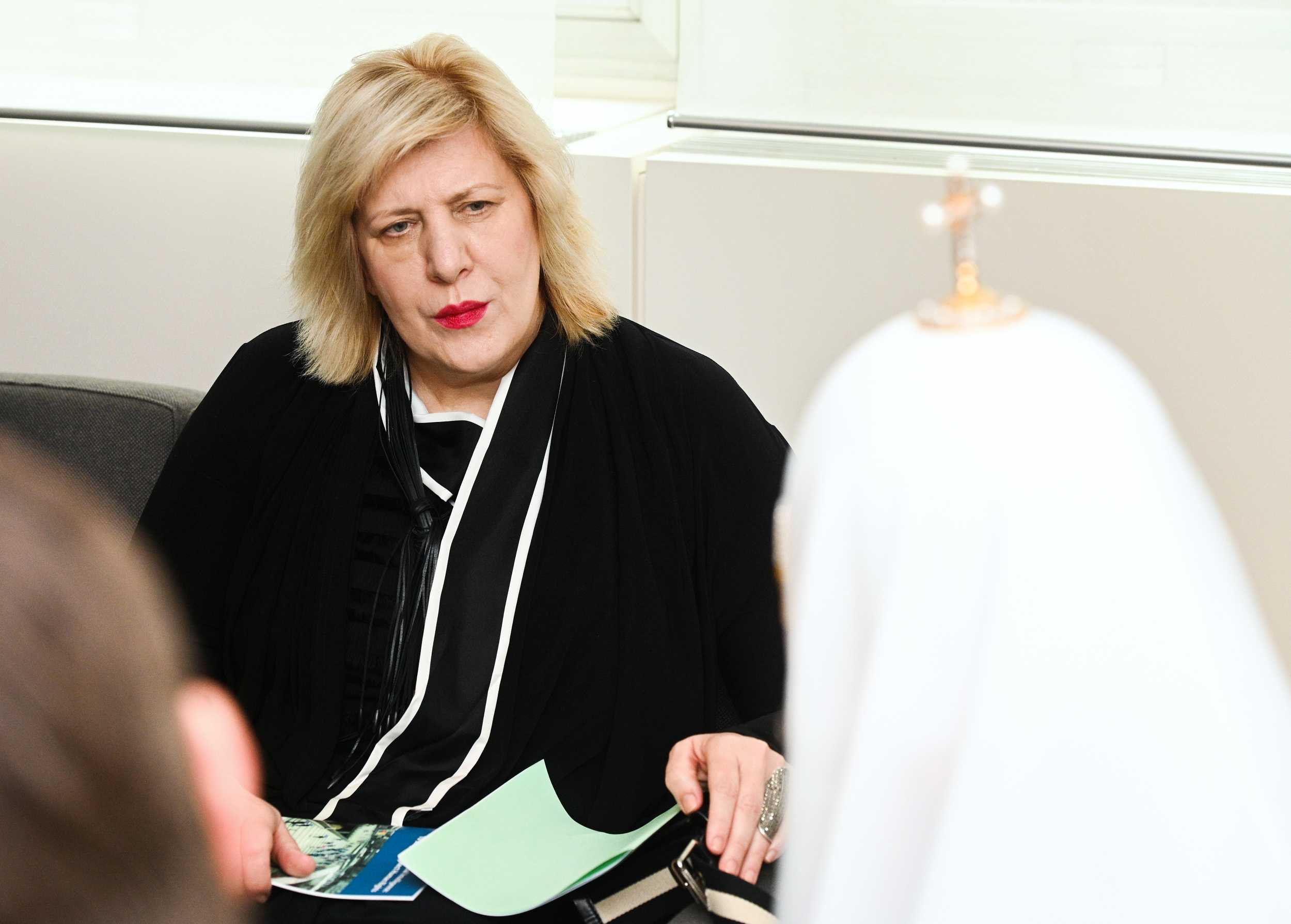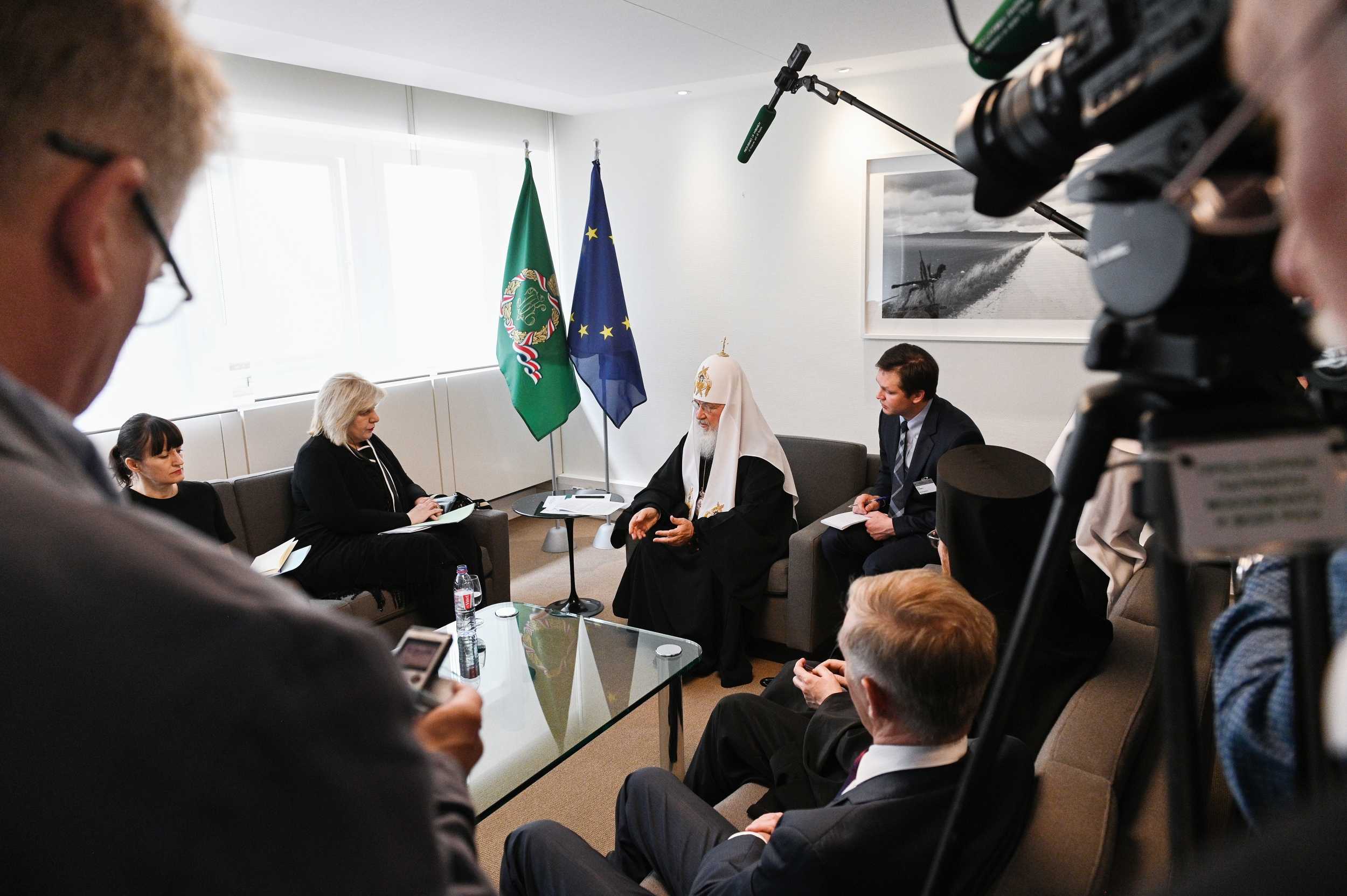Patriarch Kirill meets with Council of Europe Commissioner for Human Rights





On May 27, 2019, His Holiness Patriarch Kirill of Moscow and All Russia met with the Council of Europe Commissioner for Human Rights Ms. Dunja Mijatović.
Taking part in the meeting were also: from the Russian Orthodox Church – Metropolitan Hilarion of Volokolamsk, head of the Moscow Patriarchate department for external church relations (DECR); Archimandrite Philaret (Bulekov), DECR vice-chairman; Archimandrite Philip (Riabykh), Moscow Patriarchate representative to the Council of Europe and rector of the Parish of All Saints in Strasbourg; from the Russian Ministry of Foreign affairs – Mr. I. Soltanovsky, permanent representative of the Russian Federation to the Council of Europe.
The CE Commissariat for Human Rights was represented by Mr. Bojan Urumov, deputy director of the Commissioner for Human Rights secretariat; and Mr Furkat Tishaev, adviser to the Commissioner.
Addressing Ms. Mijatovic, Patriarch Kirill noted the important role played by the Council of Europe as an organization that proclaimed human rights advocacy as its primary goal.
“It is very important that the Council of Europe has a potential and specialists capable of helping people resolve concrete problems connected with human rights violations”, His Holiness said, “You certainly know better than I do that the problem of human rights violations exists on various levels, for instance, when the rights of whole large groups of people are violated on national, ethnic, religious, cultural grounds and when the rights of an individual are violated. There are various national structures, which should protect human rights, and I hope they are effective enough in their work, but it is important that there is also a super-national body – the Council of Europe, which deals with these problems”.
As His Holiness pointed out, for already many years the Russian Orthodox Church has paid close attention to the problem of human rights. In particular, in the 90s, His Holiness Patriarch Kirill (then Metropolitan of Smolensk and Kaliningrad) wrote two articles setting forth his view of the problem of human rights. These thoughts were later laid in the basis of the document on “Basic Teaching of the Russian Orthodox Church on Human Dignity, Freedom and Rights”.
In the course of the talk, Patriarch Kirill expressed deep concern over the discrimination against the faithful of the Ukrainian Orthodox Church, which arose as a result of the interference of previous leaders of the Ukrainian state in church affairs. “Quite recently, as you may know, important events took place as Ukraine has changed her president, and we hope that the state policy in the field of human rights will change, since the previous authorities openly embarked on the path of discrimination against people on religious grounds”, Patriarch Kirill said.
He draw Ms. Mijatovic’s attention to the fact that in Ukraine under the previous President Peter Poroshenko, two laws were adopted which fringe upon the rights of the canonical Ukrainian Orthodox Church.
Thus, in December 2018, the head of the state signed the law that provides for the renaming of the Ukrainian Orthodox Church of the Moscow Patriarchate. Speaking about this legislative act, His Holiness recalled the fundamental principle of relations between a secular state and religious organizations, which presupposes the non-interference of state authorities in their internal affairs. In particular, a state should give a religious group an opportunity for naming itself as it believes necessary.
“In Ukraine a law was adopted that prohibits the Ukrainian Orthodox Church from calling itself Ukrainian”, His Holiness continued, “In spite of the fact that the Church consisted fully of Ukrainian nationals, they tried to present it as a Church of the Russian Federation, although its whole administration is located in Ukraine and it enjoys full autonomy from the Church in Russia”.
Patriarch Kirill also mentioned the law adopted by the Ukrainian Supreme Rada last November. It concerns the procedure for changing the jurisdiction of religious communities, which ultimately can deprive the canonical Ukrainian Orthodox Church of all her churches.
Speaking about the new rules prescribed by this law, His Holiness said, “Any resident of a settlement, be he Orthodox or atheist (what is more, he may not even live in this settlement) is given the right to come to the community’s assembly and demand that its Orthodox parish should change its jurisdiction”. Such situations have led to protests of ordinary parishioners who were against the transfer of their churches to a different jurisdiction, and protesting people were often subjected to bodily attacks. “This completely unlawful practice existed in Ukraine before these elections”, he said.
At the same time, Patriarch Kirill drew the attention of his interlocutor to the fact that when believers began appealing for the legal protection of their rights, in absolute majority of the cases, the court took the side of the complainants. His Holiness stressed, “Despite the strong political pressure, courts fulfilled their function honestly. All that concerns the gross violation of religious rights came from the legislative and executive authorities but was rejected by the people. And the results of the presidential elections in Ukraine have shown that the people had not welcomed the policy which used to be imposed by the previous authority”.
Patriarch Kirill said that he would convey to the Council of Europe Commissioner for Human Rights the documented materials on the violations of the rights of believers in Ukraine.
“When it comes to human rights and violence towards believers, it falls under my mandate, I will deal with it very attentively”, Ms. Mijatovic stressed.
She mentioned a number of issues on which she would like to cooperate with the Russian Orthodox Church. These include protection of women’s rights, opposing domestic violence, social support for the disabled, development of the civil society.
“If we have the same goal, namely, the welfare of all people on the planet, then we are already moving in the right direction. As a commissioner for human rights, I will carefully listen to your opinion. I hope that we will have an opportunity for meeting again when I come to the Russian Federation”, Ms. Mijatovic said.
“Today, the Russian Church is actively developing its social work including in the areas you have just mentioned”, Patriarch Kirill said in his turn, “We are actively working with the homeless. Our know-hows are in demand today in many cities, and we gladly share our inventions. Among them, in particular, “Salvation Bus” for help to the homeless during winter frosts. There are special church centers in which we warm, feed, and cloth them, and help them find jobs. I cannot say that all of these people but many of them get on their feet”.
His Holiness also stressed that the Church pays special attention to abandoned children. “I often come to orphanages. We are engaged in problems of adoption, seeking to find parents for them”, he said, “these efforts have now been joined by many secular organizations, and the situation is changing for the better. I would like to assure you that the Church will continue this process, and we will leave the leader’s position only when we are sure that considerable positive changes have taken places in this sphere”.
Speaking about the problem of family conflicts resulting in violence, Patriarch Kirill stated that this problem could be overcome through support for the traditional family relations between man and woman. “Perhaps, there is not a single family in which a conflict situation would not happen. A considerable percentage of divorce both in our country and in the West is an indicator of such conflicts. However, when one lifts his hand against the other the struggle is already lost”, he said stressing that the struggle to preserve a family should be waged when the conflict has not yet reached such a stage. “I would like to say once again that when conflicts are accompanied with violence, the struggle is lost’, he stated, ‘One can be very sorry, one can refer a case to police, but people get lost for one another. Therefore the Church is engaged in struggle ‘on long-range defense’ in such conflicts.
The Primate of the Russian Church also noted that the Church is carrying out the work for giving charitable aid to those who became victims of family conflicts, including, by proving housing and material aid.
In the course of the talk with the Council of Europe Commissioner for Human Rights, Patriarch Kirill also spoke about the Church’s active educational work aimed to prevent abortion and help decrease their number: “The Church is categorically against abortion. We work with young women but only addressing them in the church. Our consultants work in institutions in which abortions are performed”.
As Patriarch Kirill noted, more often than not, the reason for a woman to resort to abortion are conflicts in her family, a lack of money, constrained living conditions, pressure from the parents or other relatives. “We say to a woman that we will take some of her difficulties upon ourselves so that she could stay with us and receive help”, he said pointing out that in such a case a considerable percentage of women refuse abortion. “Trying to talk a woman out of doing an abortion, we assume the responsibility for creating conditions of psychological relaxation for her and for her finances. We believe it a very important area of our work. Certainly, on the scale of the Church, we do not do as much as we would like to. But we have begun this work, and now in many place the state authorities are trying to do the same”.
Speaking about what is lacking for the Church to give proper attention to all the needy, His Holiness pointed first of all to time: “Now time is a deficit for all. Unfortunately, we always lack money too. But I thank God for the abundance of people who are ready to be engaged in this work”.
The sides also discussed the broadening of cooperation and a number of human rights problems.
DECR Communication Service
